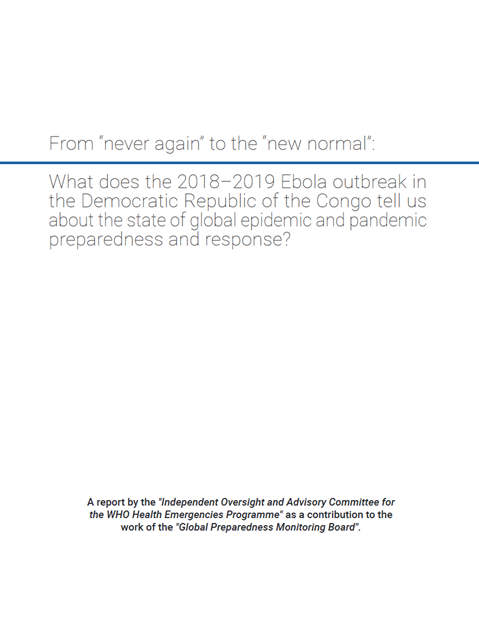From “never again” to the “new normal”: What does the 2018–2019 Ebola outbreak in the DRC tell us about the state of global epidemic and pandemic preparedness and response?
IOAC

Overview
The scale of the tragedy caused by the 2013–2016 Ebola epidemic in West Africa exposed serious failings in the way the world prepares for, and responds to, health emergencies. In the wake of the crisis the UN system and a constellation of international organizations, national governments, and international NGOs embarked on several initiatives to reform key aspects of global epidemic preparedness and response, from financing to clinical research. “Never again” was the collective refrain.* And yet, in June 2019, a typical headline in the UK press read “’Terrifying’ Ebola epidemic out of control in the Democratic Republic of the Congo”.
What has happened, why, and what do the answers to those questions tell us about the state of the world’s preparedness for pandemic threats? Those are the three overarching questions posed by the Global Preparedness and Monitoring Board (GPMB), and which we set out to explore in this report. We are the Independent Oversight and Advisory Committee of the WHO Health Emergencies (WHE) Programme; since 2016 we have been providing independent advice on the performance of the WHE programme to WHO’s Director-General and WHO’s governing body, the World Health Assembly.
In the process of researching this report, we travelled from Kinshasa, the capital of the Democratic Republic of the Congo (DRC), 1500 kilometres east, to the city of Butembo, a historic trading hub in North Kivu that has found itself at the centre of the outbreak. Along the way we spoke with representatives from a broad cross section of affected communities; representatives of local and international non-governmental organizations; Ministry of Health staff, from the Minister of Health to coordinators and responders in the field; donors; WHO leadership and staff; and staff and leadership from other UN technical agencies. We used these conversations to supplement and validate desk-based literature reviews and phone interviews.
